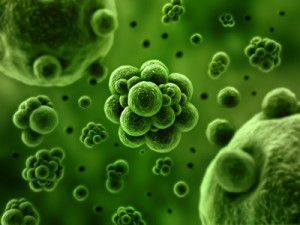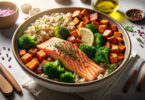By Mareya Ibrahim
Guest Writer for Wake Up World
It’s spring for us in the north. More fresh fruits and vegetables are available and many people are looking to improve their diet. The benefits of increasing the amount of produce in your diet are tremendous. In fact, the US Department of Agriculture recommends that you fill half your plate with fruits and vegetables with every meal. The health benefits of eating plentiful produce include reducing your risk for heart disease, obesity, type 2 diabetes, high blood pressure, bone loss, kidney stones, not to mention the enormous number of phytonutrients fresh produce provides.
Dangers and Prevalence of Contaminants
The fact is, fresh produce is grown with fertilizers, dirt, manure, pesticides and other potential contaminants. Some studies, financed by major produce growers, claim that 98% of produce has no detectable pesticide residue but the Environmental Working Group’s (EWG) studies counter that claim. They detected pesticide residue on 63 percent of the samples they tested. Competing studies and political agendas aside, if you increase the level of fresh produce in your diet to recommended levels, you may be increasing your exposure to contaminants.
Every year, the EWG tests samples of 45 different fruits and vegetables and publishes their findings. Once their study is complete, they publish two lists, which you may recognize – the Dirty Dozen and Clean Fifteen. The two lists highlight the produce with highest and lowest levels of pesticides. According to the study, if you eat a lot of apples, celery, and bell peppers, you may be exposed over 100 different pesticides. Some of their findings in the most recent study were shocking. Bell peppers had residue from 88 different pesticides. A single sample of grapes had 15 different pesticides.
Perhaps the most shocking part of the study is that all tests were completed after the produce was washed or peeled. So even if you are rinsing your fruits and veggies with water, it’s clear that you are not removing all of the potentially harmful ones, as they are not all water-soluble.
How to Reduce Exposure
One solution is to buy organic. Chemical pesticides are not used in the production of certified organic produce. However, they are still grown in the ground, handled and touched by an average of over 20 different sets of hands with many points of potential contamination before they get to your plate, so washing them thoroughly is still a critical step.. Rinsing with water is recommended by most agencies, but as we saw with pesticides, this does not come close to removing every contaminant. Even the Center for Disease Control claims that rinsing with water may not be effective when it comes to addressing bacteria.
To remove the maximum amount of pesticides, dirt, and bacteria from your diet, you may want to consider cleaning your fruit and vegetables with a produce wash. There are many recipes for creating your own solution out of vinegar, lemon juice, baking soda and water. However, these are not always effective. For convenience and a solution that is taste-free (do you really want your strawberries tasting like vinegar and lemons?) you can purchase an effective, all-natural produce wash like Eat Cleaner ®
Eat Cleaner is a brand of all-natural produce wash invented by an environmental scientist and natural products industry veteran, and is made in the USA. In lab studies of their product, it was shown to be over 99% more effective than water at removing bacteria-carrying dirt and pesticides and was also shown to improve the shelf-life of produce by 200%.
To summarize, while you should probably look to increase the amount of fresh fruits and vegetables in your diet, also be wary of the contaminants in your food. To minimize your exposure, buy organic, especially for the Dirty Dozen, and wash all of your produce with an effective fruit and vegetable wash.
Sources for this article:
http://www.choosemyplate.gov/food-groups/fruits
http://www.keeperofthehome.org/2012/07/homemade-lemon-citrus-produce-wash-natural-fast-easy
About the Author
Mareya Ibrahim is The Fit Foody, an award-winning inventor, chef, nutrition expert, author and founder of EatCleaner.com. Her book “The Clean Eating Handbook” was released in May 2013 and is being touted as the ‘go-to’ guide for anyone looking to eat cleaner and get leaner. She is a featured chef on ABC’s Recipe Rehab, eHow.com, Livestrong.com and the food expert for San Diego Channel 6 News. She is the recipient of the 2013 California Women Making a Difference Award, The Disney iParenting Award, and The World’s Best Technology Gold Prize.

If you've found value in our articles, we invite you to support the release of our brand-new book, "Gratitude Practices for Kids: A Practical Guide for Adults to Instill a Spirit of Appreciation and Positivity in the Next Generation."
"Gratitude Practices for Kids" brings together over 25 innovative and accessible practices designed to enhance gratitude in everyday life. This comprehensive guide is backed by 17 scientific studies, ensuring each concept is grounded in research, underscoring our commitment to nurturing growth, emotional intelligence, and positive interactions between adults and children.
We encourage you to opt for the paperback version to celebrate this new release. Dive into its fresh pages away from digital distractions, allowing you to immerse yourself in the transformative practices it offers.
Over recent years, Wake Up World has faced significant online censorship, which has impacted our financial ability to operate. Moving into book publishing represents a strategic step to secure the ongoing funds needed to continue our mission. By purchasing Gratitude for Kids, you help us keep our content free and accessible to everyone, avoiding needing a paywall. With over 8,500 articles published in the last 13 years, we remain dedicated to keeping our valuable content open to all.








